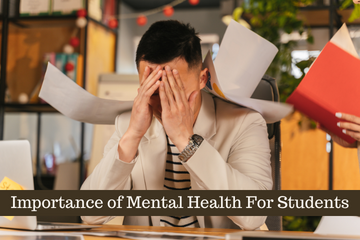Last Updated on 2 years by studentliveinfo
In the event that you find yourself thinking, “I am a failure,” it is essential to be aware that there are actions you may take to improve how you feel. Having the knowledge of how to respond to setbacks in a constructive manner removes some of the anxiety associated with them, and it may lessen the impact of the setbacks so that you may get back on your feet even stronger than before.
It is crucial to acquire the abilities necessary to manage and triumph over obstacles like these as there is a possibility that you will encounter failure in the profession at some point. Failure might feel like a terrible experience; however, it can also be a wonderful chance for growth and development if approached correctly.

Finding constructive ways to accept and improve upon one’s situation following the occurrence of challenges can be made easier by gaining an understanding of failure and establishing tactics for overcoming it.
Some of the key points for how to deal with failure are listed below:
Table of Contents
Acknowledge the Appropriate Level of Responsibility
People who are quick to blame their lack of accomplishment on others or external circumstances are familiar to all of us.
It is essential to be self-aware to recognize when other, external causes have influenced your success. You don’t have to blame yourself for everything, and you shouldn’t even try to do so, especially if it is beyond your control.
However, it is equally essential that you acknowledge the things that you could have done differently in order to make things better.
For instance, are there ways in which you could have trained or worked harder? Were you able to make your edit as good as it possibly might have been? Have you truly prepared yourself for that interview in the very best way that you possibly could?
Accept responsibility for the aspects of the situation over which you have some influence, and resist the urge to hide behind excuses. This is one of the crucial steps to knowing how to deal with failure in career and study.
Recognize the Dangers of Unhealthy Means to Alleviate Pain
You could be tempted to say something along the lines of “I didn’t genuinely want that job anyhow,” but trying to minimize your anguish won’t make it go away. You won’t find relief from your suffering by trying to distract yourself or by trying to replace the hole you feel with food, drugs, or alcohol.
These products will only give you some momentary alleviation from your discomfort. This point is the stepping stone to knowing how to deal with failure in career and study.
Recognize the destructive methods in which you attempt to escape or lessen the impact of the suffering in your life. Your predicament will only become more difficult if you resort to coping strategies that cause more problems than they solve.
Acknowledge and Be at Peace with Your Feelings
You have to come to terms with the fact that failure will, at the very least, initially be painful for you. In the long run, it is often unproductive to make an effort to lessen the impact of your emotions or divert yourself from them.
Simply acknowledge your feelings for what they are and give yourself permission to hurt for a little while.
However, you shouldn’t spend too much time thinking about it. Even doing that is counter-productive, especially if you hold yourself responsible for the problem.
Wait a few days for the discomfort to subside, and then begin to carry on with your life. Inorder to know how to deal with failure it is essential to acknowledge your feelings.
Transform Unproductive Feelings into constructive
You should make an effort to channel unpleasant feelings into the motivation you need to discover a solution to the problem. First, you should reflect on what went wrong, and then you should devise a strategy on how to prevent it from happening again.
It is vital to understand how you feel after a setback, but it is also crucial to think about how you might use those feelings to reengage with your goals.
Create a methodical plan for analyzing your routines and procedures in order to pinpoint the cause of the error or the setback. After you’ve determined what caused the problem, it’s time to think of ways to fix it and stop it from happening again.
Seek Help from Friends and Family
Failures can be processed and overcome with the assistance of external support. Your feelings may be validated by a friend or colleague, or they may hear a similar narrative of failure that makes their own seem less significant.
Your family and friends could have some suggestions for you, or they might just give you a safe space to voice your concerns.
It is vital to talk about your experiences and feelings in order to have a better understanding of them, to lessen the impact they have on you, and to explore potential solutions with people you can trust.
Additionally, when you ask other people for support and give support to them in return, it might increase the quality of your connections with those people.
Look at Your Past Errors for Sources of Motivation
It’s possible to gain insight and motivation to create various kinds of life changes from the errors you’ve made.
For instance, if you realized that you had made a mistake, you could seize the opportunity to devise a novel approach to carrying out the task at hand or making progress toward the primary objective.
It is possible to get something of value from the experience of making a mistake by viewing it as a chance to innovate and find solutions to problems. Learning from past mistakes helps you how to deal with failure.
Discover a Refreshing Point of View
Consider that a setback presents you with an opportunity to learn something new and broaden your horizons. You might discover new ways of thinking about your routines if you start by noticing your feelings, engaging in self-care practices, and critically examining your actions.
Failure can provide an excellent opportunity to examine one’s routines and patterns of thought in order to discover new approaches to tackling obstacles or achieving goals.
When you consider obstacles or objectives from a different point of view, you could come up with other ways to overcome them.
Make a Strategy for Moving Forward
After you’ve recognized your shortcomings and figured out what it is you can take away from them, you’ll be in a position to formulate a strategy for moving forward.
It is important to bear in mind that concentrating on your difficulties or going over your past mistakes will only serve to keep you stranded.
Put an end to the negative thought pattern of “I am a failure” and replace it with “I am capable of trying again.”
Consider how you may approach the situation differently the next time you go through it, using the knowledge you’ve gained. Make a strategy that will assist you in putting the knowledge you’ve received into action by creating a plan.



0 Comments